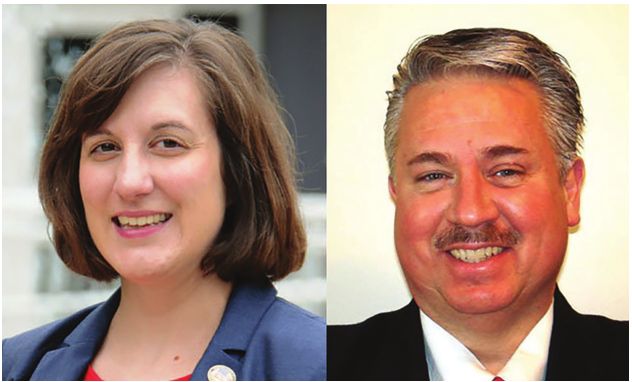
Candidates from 2015 campaign try again
As elective offices go, the Springfield city clerk’s post isn’t the sexiest.
It’s an administrative position, tasked with keeping minutes of city council sessions and otherwise collecting, maintaining and disseminating the city’s records, from birth and death certificates to tickets for code violations incurred by property owners. The office isn’t big – not counting the elected clerk, who makes slightly less than $90,000 per year, it employs four people.
That doesn’t mean the position isn’t worth a fight.
Rianne Hawkins, once deputy city clerk, lost by 472 votes in 2015, when nearly 26,000 votes were cast in the race and more than 1,300 voters who voted in municipal elections that year didn’t check a box for city clerk – by contrast, fewer than 120 voters four years ago didn’t express a choice for mayor. Hawkins is, again, running against Frank Lesko, the incumbent who brings a long record as an elected official and government employee. He’s held elective office in Sangamon County since 1997, when he became a member of the Springfield Park District board, then became a city alderman. He gave up the chance for a third term on the council to run for clerk in 2015. He’s also held jobs with the city, the county and the state.
City races are, officially, nonpartisan.
Lesko is a Republican who has won the county party’s endorsement. Hawkins is a Democrat who’s gotten financial support from a campaign fund controlled by Bill Houlihan, downstate director for U.S. Sen. Richard Durbin. Both candidates have received contributions from labor groups.
Since leaving the city clerk’s office after Lesko beat her in 2015, Hawkins has worked for the AFL-CIO as a campaign coordinator and, most recently as a project manager and lobbyist for Planned Parenthood of Illinois. She said she doesn’t believe her current work for Planned Parenthood should influence the outcome in a town where many voters are Catholic.
“The clerk’s office doesn’t have anything to do with Planned Parenthood,” Hawkins says. “I think the race is about the issues in the city clerk’s office, not about my current employer.”
Hawkins says the city clerk’s office hasn’t done enough to get
information to the public. For example, she says that building code
violations should be posted on the city’s website as a matter of course;
as it stands now, requests made under the state Freedom of Information
Act are required to get information about code violations, and the city
can take five days or longer to respond. Administrative court records
should be indexed and easy to find, she adds. The city posts FOIA
requests submitted to the city, but not responses, as it did before
Lesko became clerk. Hawkins says responsive documents to FOIA requests
should be posted. Businesses should be able to apply for licenses
online, she adds.
“We can’t afford four more years of a clerk who isn’t actively looking for ways to move the city forward,” Hawkins says.
During
his first three years in office, Lesko says he’s reduced the clerk’s
budget by more than $65,000. “We’ve just cut back on a lot of the
expenses that we use in the office,” he says. “We’re working smarter, as
far as we do a lot of things online now.” He says he also expects to
have a kiosk installed in the city clerk’s office so that people without
internet access can quickly get information.
Lesko
says he’s talked to departments about putting code violations and other
routine information online so that FOIA requests aren’t required. “They
haven’t said that they don’t want to do it,” he says. “It would be more
work for them. ... Everyone’s been very cooperative and very open to
making government more transparent.”
Lesko
says he isn’t sure that posting responses to FOIA requests online would
be a good idea. “Sometimes, it could get into proprietary information,”
he says. Under state law, however, what’s public is public – government
can’t keep secret from one person what it releases to someone else.
Both
candidates say they would continue online posting of FOIA requests,
except requests made for police or fire department records, so that
anyone easily can see what records requests have been made to the city.
Why bother? Both candidates say it’s a matter of transparency. “Overall,
I can’t say that I’ve seen a problem,” Hawkins says. Lesko agreed.
“The
benefit is to keep people informed, I guess,” Lesko says. “If one
person wants to know what another person is doing, or what requests have
been made, it’s a way for someone to find out without making a call to
the clerk’s office. I think that is the benefit.”
Contact Bruce Rushton at [email protected].